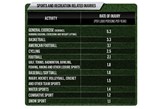Golf: More dangerous than rugby
Published: Last updated:
Golf is more dangerous than rugby, according to a new survey of sports injuries.
It’s not people being hit by balls or clubs, though, but lower back and joint injuries through swinging a club.
Recreational sports – including golf – have an injury rate of 1.8 per 1,000 persons, higher than rugby, hockey and other team sports (1.5 per 1,000 persons)
The incidence of injury among amateur golfers is between 15.8% to 40.9% annually; among professionals, the incidence ranges between 31% to 90% annually
Lower back injuries account for 15.2% to 34% of all golf injuries, followed by injuries to the elbow (7% to 27%), shoulder (4% to 19%) and wrist 10%

The survey, by golfsupport.com, also says that each year 40,000 golfers seek emergency treatment due to head injuries caused by errant golf balls and flying clubheads.
Golfsupport.com analysed several reports on sports and recreation related injuries including the report by the National Health Statistics (NHSR) which investigated 8.6 million injuries in different sports. Surprisingly, none of the more “violent” sports such as football, boxing and rugby had the highest rate of injury.
Golfsupport.com found that at the rate of 5.3 per 1,000 persons, general exercise – aerobics, exercising, running, jogging and weightlifting – is statistically speaking, the most dangerous sport/physical activity.
The second highest rate of injury – 3.3 per 1,000 persons – was in basketball, followed by American football (3.1 per 1,000 persons), cycling (2.5 per 1,000 persons) and football (2.1 per 1,000 persons).
At the rate of 1.8 per 1,000 people, recreational sports – which also include golf – were found to be more “dangerous” than rugby, hockey and other team sports that have a rate of “only” 1.5 per 1,000 persons.

Based on the NHSR’s results, it is even safer to train combative sport (rate of 1.2 per 1,000 persons) and engage in snow sport (rate of 1.1 per 1,000 persons) than to play golf, tennis, badminton and other racquet sports as well as bowling, fishing, hiking and other leisure sports.
Further investigation into the risk of injury in golf revealed that as many as 15.8% to 40.9% of amateur golfers get injured each year, while the lifetime incidence of injury ranges from 25.2% to 67.7%. Study by the British Journal of Sports Medicine also reveals that the incidence of injury is even higher in professional golfers: 31% to 90% annually and 31% to 88.5% in a lifetime.
Golf injuries were also found to be potentially very severe and even fatal, especially those involving the head. According to a study by Golf Digest, each year an estimated 40,000 golfers seek emergency treatment due to injuries caused by errant golf balls and flying clubheads.
High risk of severe injuries is also associated with the use of golf carts. According to a study published by the American Journal of Preventive Medicine, golf carts are responsible for as many as 15,000 injuries per year but it is important to note that not all of the injuries are related to golf.

Gary Swift, MD of Golfsupport.com said: “Results of the research analysing the risk of injuries per sport, and in particular golf, reveal that the risk is much higher than commonly thought. If we can trust the statistics, more people are injured while playing golf, badminton, tennis, fishing and even bowling, to mention just a few leisure sports included, than by playing rugby, hockey and similar team sports that are generally regarded to be injury high-risk.
“Findings of the research also suggest that neither the risk or severity of injury in golf are taken seriously enough. There is a lot of material on how to improve your golfing skills but there is very little on how to stay safe and reduce the risk of injury while enjoying the game.
“Considering that almost seven in 10 amateurs and nine in 10 professionals will suffer a golf-related injury at least once in a lifetime, I strongly believe that the issue should receive more attention than it currently does.”





